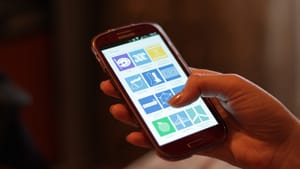Stay in the Loop
BSR publishes on a weekly schedule, with an email newsletter every Wednesday and Thursday morning. There’s no paywall, and subscribing is always free.
How Big Brother works – maybe
How much privacy do you have with your smartphone?

OK, everybody out there who’s recently read an article issued by the Pew Research Center raise your hand.
That’s what I thought. Those two young ladies in the back with their hands up don’t count. They’re giggling.
Maybe we should all consider seeking this group’s work out a bit more often. Not only are they admirably objective (yeah, I know, there’s no such thing, but they are), but they also often bring us food for thought if we’re willing to think.
Late in April, for example, Pew issued a piece with the ultra-dry title “Mobile apps collect information about users, with wide range of permissions.” Before getting to the titular substance of the piece, writer Kenneth Olmstead led up to that by observing that the Supreme Court will hear two cases this year that will address the question of whether or not the police should be allowed to search the contents of a mobile device without a warrant. Now should you totally abide by the law and avoid all others the police would find suspicious (ahem, former Eagle DeSean Jackson), a warrantless search seemingly wouldn’t concern you much.
Or would it? Let’s imagine you find yourself in the immediate aftermath of a fender bender, or perhaps, a somewhat more serious motor vehicle accident. Would you always be totally comfortable handing over your smartphone to a police officer who wants to make sure you weren’t just using that phone to make or receive a call, or horror of horrors, to send a text or email message?
Doesn’t the Fourth Amendment to the Constitution forbid that, you might answer, cleverly sidestepping the question? You might assert that this amendment forbids “unreasonable searches” that violate citizens’ security in “their persons, houses, papers, and effects.” And so it does. However, here’s how this particular question falls between sixes and sevens (or since we’re talking about the Supremes, between fives and fours): Is it a sure thing that the justices will consider the effect (the mobile phone) a personal effect?
In what way isn’t it? Olmstead gives us a huge clue.
The Permission Society
If you have downloaded an app or apps into your phone, you have already given somewhere between one and 126 permissions for essentially total strangers to access your information on that device. That 126 figure is the Pew group’s count of all the different permissions asked for by apps in 2013. Some apps ask for only one permission; others ask for as many as 47. As Olmstead writes, “in the Android operating system, users are first presented with what information and features an app requires when they attempt to download an app. This information is organized into a list of ‘permissions.’ Users must either accept the entire list, or decline to use the app.”
Among the categories of information you have already likely given access permission for, to the app-people, are the following: your location, your personal information, services that cost you money (call that “standard business practice”), your accounts (a broad category comprising permissions to access other “stuff” on your phone like Gmail or Google Maps), and hardware (in other words, not only information on the phone, but devices embedded in it, like the camera your friend used to take a photo of you using a water bong).
“Oh, brother,” Big Brother might well say, “how private is this device, really? This pot-smoking, drunken disgrace has already given 811 permissions to his information to 39 different app companies employing a total of 2,254 individuals.”
Clarence Thomas would likely buy that. Silently.
Sign up for our newsletter
All of the week's new articles, all in one place. Sign up for the free weekly BSR newsletters, and don't miss a conversation.

 Rick Soisson
Rick Soisson